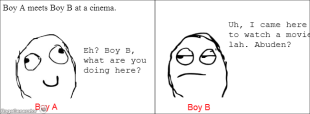Popular Malaysian Slang
Note:This article on 20 Slang Malaysians love to use was written by our Malaysian writer and created and first published on the Malaysian expansion of TheSmartLocal.com.
We Malaysians can get very creative with our word choices. Forget the fancy pants ang moh vocabulary. Not many countries are able to speak a full sentence that combines different languages and still have people understand what they're saying. But, we Malaysians can.
We're so used to speaking Rojak English that some of us can't speak proper English to save our lives. But that's what makes us so unique, right? Here's what I'm talking about.
1. Leng Zai (or Leng Chai) / Leng Lui
Leng Zai (or Leng Chai) meaning: Leng Zai comes from the Cantonese word 靚仔 which means handsome (boy). Leng Zai is more commonly used among Chinese, while Leng Chai is more commonly used among Malays and Indians, it’s just a matter of pronunciation.
Leng Lui meaning: In Cantonese it's written as 靚女 which means pretty (girl).

While these words are normally used as a compliment, we Malaysians sometimes call random strangers we don’t know Leng Zai or Leng Lui to get their attention, too. Sometimes we’d rather say “Eh, leng zai” or “Eh, you leng lui over there”, than the usual “excuse me” which should work fine in grabbing someone’s attention, but we're too cool for that.
2. Abuden
Meaning: A sarcastic remark used for people who state the obvious.Example:

Or, to up the sarcasm, we do this:

3. Ah
Meaning: A word lazy Malaysians use to replace “yes”
4. Boss
Meaning: A word used to describe either the workers or the customers at a Mamak Stall (yes it works both ways)

5. Cincai
Meaning: Literally means whatever.

6. Yum Cha
Meaning: Yum Cha is another word derived from the Cantonese language. Yum Cha (饮茶) literally means “drink tea”, it is an act of drinking Chinese tea and having dim sum for the Chinese. Nowadays all Malaysians use the word to mean “hang out” or to have a high tea of sorts.
7. Walao / Walao Eh
Meaning: A word used to describe the feeling of surprise or disbelief.
8. Ang Moh / Guai Lou / Mat Salleh
Meaning: A word used to describe Caucasians. Ang Moh and Guai Lou is more commonly used among Chinese, while Mat Salleh is more commonly used among Malays and Indians.Girl: OMG HE'S SO LENG ZAI.
Boy: I leng zai also lah.
Girl: But he's Mat Salleh, means he's more leng zai.

9. Uolls (you-alls) / Iolls (I-alls)
Uolls meaning: It is synonymous to “you all” or “you guys”Iolls meaning: Basically a fancy word for “I”


10. On The Way
Okay, so this isn’t exactly a Malaysian slang word, but to Malaysians, it doesn’t mean “in the course of a journey”. Nope, to us it means “I’m still getting ready” or “I just got out of my house”. Expect that person to arrive in another half hour’s time (minimum) if he/she is a Malaysian.
11. Tapau
Meaning: Tapau comes from the Chinese word 打包 (da bao) which means take away (food).
12. That's why lah
Meaning: The phrase "that's why lah" literally translates into "that explains it" in proper English.
13. Bo Jio
Meaning: Bo Jio derives from the Hokkien word that means "never invite", we Malaysians normally use it to people who didn't invite us to a certain event, outing or gathering.
Commonly seen on Facebook comments (especially pictures), Twitter and Instagram.
 Source: kuanyee
Source: kuanyee 
14. Also
Meaning: This word is used due to the heavy influence of the Malay and Chinese language. It is more of a direct translate from the Malay word "pun" and the Chinese words 也 (ye) and 都 (dou).
15. Belanja
Meaning: Belanja is a Malay word that means "treat", as in treating someone to food or drinks.
16. Perasan
Meaning: Perasan is actually a Malay word that means "notice", but for some reason it ventured out of its origins and now we Malaysians use it to say "don't flatter yourself".
17. Potong Stim (or Potong Steam)
Meaning: A term used to describe a good moment being ruined, kind of synonymous to the English word "killjoy".
Upon closer inspection...

18. Gostan
Meaning: Apparently Gostan is derived from the nautical English phrase "go astern" which means "to go backwards". Nowadays we Malaysians use it to mean "reverse" (a vehicle).
Gostan king right here
19. Where Got
Meaning: This phrase is directly translated from the Malay words "mana ada" and the Chinese words "哪里有" (na li you).
20. Kantoi
Meaning: Kantoi is a word used when someone gets caught red handed, or in other words, busted.


No comments:
Post a Comment